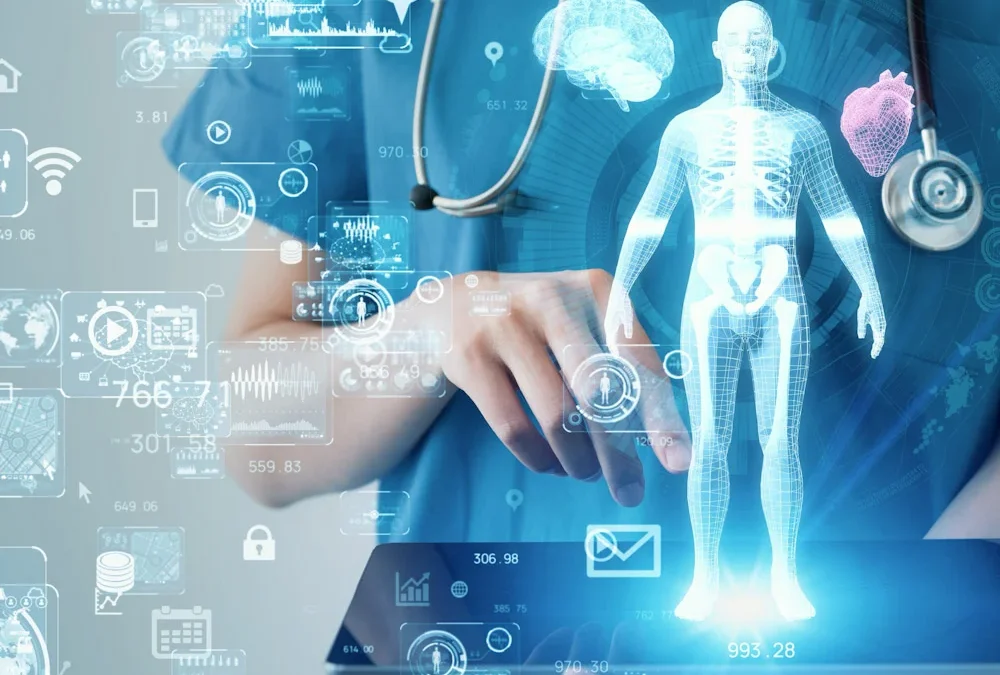Over the past five years, digitisation has brought about a transformative wave of change in the National Health Service (NHS) in the United Kingdom. The integration of advanced technologies and the digitisation of health records and services have significantly impacted patient care, operational efficiency, and healthcare outcomes. This article explores the profound influence of digitisation on the NHS, highlighting the key advancements and benefits realised in the past half-decade.
Enhanced Accessibility and Patient Experience:
Digitisation has revolutionised the way patients access healthcare services. The implementation of online appointment booking systems and virtual consultations has made it more convenient for patients to seek medical advice and support. Patients can now communicate with healthcare professionals remotely, reducing the need for in-person visits and minimising waiting times. Additionally, patient portals and mobile applications have empowered individuals to access their health records, schedule appointments, and receive personalised health information at their fingertips.
Streamlined Electronic Health Records (EHRs):
The adoption of Electronic Health Records (EHRs) has significantly improved the efficiency and accuracy of medical documentation within the NHS. The transition from paper-based records to digitised systems has enabled healthcare providers to access comprehensive patient information instantly, facilitating quicker diagnoses and treatment decisions. EHRs also promote better coordination and information sharing among healthcare professionals, ensuring continuity of care and reducing the risk of medical errors.
Enhanced Data Analytics and Research Capabilities:
Digitisation has unlocked vast opportunities for data collection and analysis, thereby supporting evidence-based decision-making and research within the NHS. With the aggregation of large-scale health data, healthcare providers can identify trends, patterns, and risk factors, leading to improved disease prevention and population health management. Advanced data analytics also aid in predicting outbreaks, optimising resource allocation, and identifying areas where interventions can have the greatest impact.
Telemedicine and Remote Monitoring:
Telemedicine and remote monitoring have emerged as game-changers in the delivery of healthcare services. The availability of high-speed internet and improved connectivity has facilitated real-time video consultations, allowing healthcare professionals to remotely diagnose and treat patients, particularly those in remote or underserved areas. Furthermore, remote monitoring devices, such as wearable sensors and IoT-enabled devices, enable the continuous tracking of patients’ vital signs and health parameters, providing valuable insights for managing chronic conditions and promoting proactive care.
Improved Efficiency and Cost-Effectiveness:
Digitisation has brought significant improvements in operational efficiency and cost-effectiveness within the NHS. Automated appointment reminders and online scheduling have reduced no-show rates, optimizing resource utilization and minimizing waste. Moreover, digital systems have streamlined administrative tasks, enabling healthcare professionals to spend more time on direct patient care. The reduction in paperwork, duplication of tests, and improved coordination among healthcare teams have also contributed to cost savings and resource optimisation.
Conclusion:
The digitisation of the NHS over the last five years has had a profound impact on the delivery of healthcare services in the United Kingdom. Enhanced accessibility, streamlined electronic health records, improved data analytics, telemedicine, and increased operational efficiency have revolutionised patient care, healthcare outcomes, and resource management. While challenges related to data security, interoperability, and digital divide remain, the potential for further advancements in digitization within the NHS is immense. As technology continues to evolve, the future holds the promise of a more connected, patient-centric healthcare system that leverages the full potential of digitisation to improve the health and well-being of all UK Residents.
If you’d like to learn more about our virtual ward and care home software solutions, please book a call with our team


Recent Comments